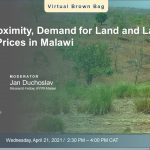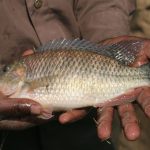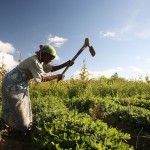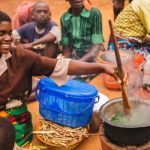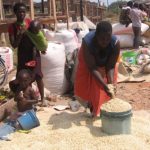Virtual Brown Bag: Urban proximity, demand for land and land shadow prices in Malawi Date: Wednesday, March 21, 2021 Time: 02:30 pm to 04:00 pm CAT Register Presenter slides and a blog will be available in the days following the event. Abstract We assess the spatial and intertemporal variation in farmland prices using per hectare […]
Price Bulletin for Livestock and Livestock Products -#6b- March 2021
This price bulletin for livestock and livestock products, was developed by researchers at IFPRI Malawi with the goal of providing clear and accurate information on the variation of weekly retail prices of selected agricultural commodities that are important for food security and nutrition in Malawi. The reports are intended as a resource for those interested […]
Price Bulletin for Selected Legumes, Roots and Tubers, and other Cereals -#6a- March 2021
This price bulletin for selected legumes, roots, tubers, and other cereals was developed by researchers at IFPRI Malawi with the goal of providing clear and accurate information on the variation of weekly retail prices of selected agricultural commodities that are important for food security and nutrition in Malawi. The reports are intended as a resource […]
Virtual event: Food Prices for Nutrition in Malawi: Methods and results on the cost, affordability, and seasonality of nutritious diets
Virtual event: Food Prices for Nutrition in Malawi: Methods and results on the cost, affordability, and seasonality of nutritious diets Date: Thursday, April 15, 2021 Time: 03:00 pm (SAST) Register Join the Food Prices for Nutrition team and our collaborators for an introduction to our diet cost metrics and results from recent research in Malawi. […]
IFPRI Malawi Maize Market Report March 2021
The Monthly Maize Market Reports are developed by researchers at IFPRI Malawi, with the main goal of providing clear and accurate daily maize price data in selected markets throughout Malawi. The reports are intended as a resource for those interested in maize markets in Malawi, namely producers, traders, consumers, or other agricultural stakeholders. Highlights • […]
- « Previous Page
- 1
- …
- 65
- 66
- 67
- 68
- 69
- …
- 79
- Next Page »
